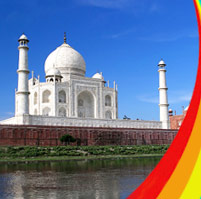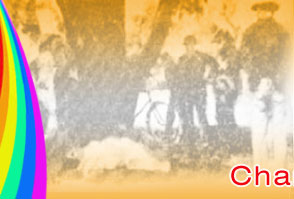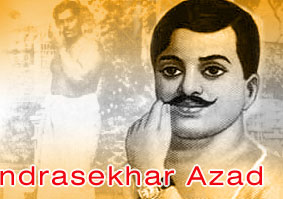One of the torchbearers of the revolutionary struggle
against the British, Chandrasekhar Azad was born Chandrasekhar Tiwari on
July 23, 1906 in the Bhabhra village in Madhya Pradesh. It was during
his teenage days that Chandrasekhar adopted the sobriquet of 'Azad'
which stands for 'free' in Urdu. Consequent to this, Azad vowed that he
would never be taken alive by the British and would instead fight till
his last breath.
Like many of his contemporaries, Chandrasekhar Azad too got
disenchanted with the non cooperation movement when Gandhi called it off
following the Chauri Chaura mob violence in 1922. He was disappointed
with the divisions among the political leadership and believed that
armed struggle is the only way to realize the dream of a free and
socialist India. Azad joined the Hindustan Republican Association (HRA)
formed by Sachindranath Sanyal in 1923.
Chandrasekhar Azad played a key role in the famous Kakori train robbery
of 1925 in which revolutionaries of HRA led by Ram Prasad Bismil and
Ashfaqullah Khan looted the Number 8 Down Train carrying cash-bags
belonging to the British Government Treasury. In retaliation, police
launched an intense man-hunt and all the revolutionaries were rounded up
with the sole exception of Chandrasekhar Azad. In such a grim scenario,
Azad took upon himself the onerous task of rejuvenating the armed
movement.
He joined hands with Bhagat Singh and other young patriots and
converted the HRA into Hindustan Socialist Republican Association in
1927. Azad is widely regarded the mentor of Bhagat Singh and together
they infused new life and energy into the flagging revolutionary
movement. The highpoint of their association was the killing of DSP
Saunders at Lahore in 1928 to avenge the death of freedom fighter Lala
Lajpat Rai.
On February 27, 1931 Chandrasekhar Azad went to the Alfred Park in
Allahabad to meet two of his comrades. On being tipped off by an
informer, police surrounded the Park from all sides and asked Azad to
surrender. But Azad chose to fight till his last breath and opened fire
on the police. When all his ammunitions were finally exhausted and only
one bullet remained in the pistol, Chandrasekhar Azad took his own life.









